 Calendar
2025
Calendar
2025


ACCIÓN Clima: The IKI Interface Project for Central America and the Caribbean
Learn about our project! Behind every exchange format we develop for the IKI portfolio in the region, there is a team committed to its components. Also, find our delicious Christmas cookie recipe below!
- Project management: Manages and coordinates the entire project to meet the indicators that respond to the purpose of ACCIÓN Clima and its role as an IKI interface, mainly in supporting the Costa Rican government in the implementation of its climate goals.
- Climate governance: Strengthens the capacities of key actors in Costa Rica to design and implement actions that bring Costa Rica closer to its national climate goals in specific sectors, from youth to women.
- Climate and environmental finance: Promotes new forms of green financing together with the private sector, banking, and insurance industries, and encourages foreign direct investment in projects with high potential for climate change mitigation.
- Local action: Strengthens representatives of selected communities and the private sector for the joint implementation of climate change adaptation and mitigation measures.
- Regional Hub for Innovation, Climate, and Energy: Transfers peer-to-peer experiences and lessons learned from Costa Rica to other countries in the region, as well as generating new innovative approaches for the implementation of NDCs.
- IKI Interface for Central America and the Caribbean: Connects IKI-funded projects in Central America and the Caribbean in order to identify and leverage synergies between different actors.
- Communication, knowledge management, and monitoring: Follows up on project actions according to their indicators, and highlights and documents the results of these initiatives as a mechanism for positioning and transparency.
Happy Advent season! We invite you to open a door each day to discover the valuable contribution of IKI projects in the region.
Make your own German-style Christmas cookies
Ingredients
For the dough:
- 600 g flour
- 200 g sugar
- 400 g butter (soft)
- 1 egg
- Optional: cinnamon, vanilla, or other Christmas spices to taste
(Yields about 80–100 cookies; for fewer cookies, reduce the quantities accordingly)
For the glaze:
- Powdered sugar (also known as icing sugar or confectioners’ sugar)
- Lemon juice
- Food coloring
- Optional: sprinkles
Instructions
- Mix the butter with the sugar and egg, then knead in the flour and other dry ingredients.
- Let the dough rest in the refrigerator for approx. 1–2 hours.
- Line a baking tray with parchment paper, roll out the dough to about 3 mm thick, and cut out different shapes as desired.
- Bake for approx. 8–10 minutes on the upper rack of the oven at 200 °C (baking time and temperature may vary slightly depending on your oven).
- While the cookies are cooling, mix the powdered sugar with lemon juice until you get a glaze that is not too liquid nor too thick. Add food coloring to your liking.
- Decorate the cookies with the glaze and sprinkles and let them dry.
- Finally… enjoy your Christmas cookies!
Video: © IKI Interface for Central America and the Caribbean, ACCIÓN Clima Project

IKI launches new opportunities for accessing financing for climate and biodiversity action
During a high-level event on 17 November 2025 at COP30 in Belem, IKI launched new funding calls to address current challenges in climate change mitigation and adaptation, and biodiversity conservation.
IKI Large Grants: Funding for large-scale, transformative projects that support systemic change
The Federal Ministry for the Environment, Climate Action, Nature Conservation and Nuclear Safety (BMUKN) and the Federal Foreign Office (AA) have launched the IKI Large Grants (ILG) Call, which combines the previous Thematic and Country Calls. Registration is open until 17 February 2026.
ILG address current challenges in climate change mitigation, adaptation to the impacts of climate change, and biodiversity conservation every year. Participation in the ideas competition of the ILG Call is open to both German and international grant recipients as well as contractors in the form of German federal implementing organisations. Interested implementing organisations are invited to submit a project outline responding to one of the 11 thematic and country priorities. One to two projects per priority will be selected. The funding volume provided by IKI can range from 5 to 20 million euros per project.
For more information, please visit the informative page on IKI’s website.
IKI Medium Grants: Financing opportunities for projects aligned with international agreements
The German government is providing up to eight million euros for projects to mitigate greenhouse gas emissions and adapt to the impacts of climate change. A maximum of 12 projects will be funded under the Medium Grants of the International Climate Initiative (IKI). The IKI supports projects that contribute to the implementation of the Paris Agreement and the Convention on Biological Diversity in developing countries and emerging economies. Civil society organisations, academic institutions and non-profit companies in particular are invited to participate in the IKI Medium Grants. Project outlines can be submitted until 20 January 2026.
If you want more information on the subject, you can visit the website Medium Grants Call 2025. You can also join an online seminar on the IMG Call will be held by IKI on December 4, 2025. Register here.
IKI Small Grants: Up to €200,000 available in funding for local climate & biodiversity action
Local organisations are encouraged to apply for funding for climate and biodiversity projects. Registration is now open until 15 January 2026.
IKI Small Grants launched its 7th International Call for Proposals on 17th November at COP30 in Belém, Brazil. The call addresses local organizations in ODA-eligible countries with an average annual revenue between 60,000 and 500,000 euros. They are invited to apply for funding of local or regional climate and biodiversity action projects. IKI Small Grants provides funding between 60,000 and 200,000 euros. As part of the German Federal Government’s International Climate Initiative (IKI), the IKI Small Grants programme supports projects and organisations worldwide that tackle climate change, address local adaptation, and conserve forests and biodiversity. Besides financing, organizations receive support in building their role as strong actors through capacity development measures.
For more information, please visit the IKI Small Grants website.

🌍 EUDR&Data25: Innovation and Data Governance for a More Inclusive Agriculture Sector
From September 2-4, 2025, more than 250 participants from 14 Latin American countries met in San Pedro Sula, Honduras, to discuss the future of data governance in the agricultural sector and the challenges posed by the EU Deforestation Regulation (EUDR). The event was possible thanks to the support of the European Union and Germany via the IKI project REDD Landscape as part of the Team Europe Initiative, and in collaboration with Promecafé, CIAT and COSA - Committee on Sustainability Assessment.
🌱 Inclusion and Diversity in Action
EUDR&Data25 stood out for its inclusive approach: voices from women, young professionals and Indigenous peoples were heard alongside representatives from governments, the private sector, and academia. Diversity remained at the center of the debates and workshops, ensuring that those who directly experience the effects of the EUDR played an active role in shaping solutions.
💻 Beyond Traditional Conferences
The event embraced new participatory methodologies: interactive workshops, simulations, collaborative debates and even the use of artificial intelligence. In an exercise with 14 working groups, AI facilitated discussions inspired by Elinor Ostrom’s theory, helping identify key principles for a public digital infrastructure that is fairer and more sustainable.
🔑 Key Conclusions
- Digital public infrastructures (DPIs) form the foundation for inclusive systems and must be built on open standards, interoperability and clear governance rules.
- The value of data lies not in who owns it, but in its legitimate use for and goal of the common good, while respecting producers’ sovereignty.
- Multi-stakeholder governance requires transparent rules, informed consent and strong protections for rights.
- Simulations of Due Diligence Statements (DDS) revealed gaps – such as traceability and data quality – but also generated trust and practical learning.
⚖️ Challenges and Opportunities
Persistent challenges remain, including institutional fragmentation, divergent definitions of “forest,” and uncertainty regarding systems accepted by the EU. Even so, significant opportunities are emerging:
- Harmonizing regional standards and maps.
- Recognizing producers’ sovereignty; and
- Using data beyond the EUDR, for public policy, financing, or carbon markets.
🚀 Looking Ahead
The conference concluded with a call to action: to advance toward regional digital infrastructures, create clear incentives (such as access to markets, credit, or insurance), and strengthen public–private alliances under independent oversight.
Video © REDD Landscape


Unwrapping Impact: How CBF EbA Grantees Are Measuring Their Climate Gifts
The Caribbean Biodiversity Fund’s (CBF) first-ever Carbon Measurement Training Program sets a new benchmark for building grantee capacity in climate accountability in the region. Co-led by the Pan American Development Foundation (PADF), the initiative brought together 35 participants from 20 organizations across nine Caribbean countries to strengthen carbon measurement and reporting. Through hands-on sessions in ecosystem carbon accounting, participants gained practical skills in mapping, sampling, and analysis of mangroves, seagrasses, and other carbon pools. Grantees like Fundación REDDOM and World Conservation Society WCS are already applying these tools in the field, integrating carbon monitoring into restoration efforts and feeding data into broader climate reporting. By empowering grantees to measure what matters, the CBF and PADF are advancing transparency, collaboration, and climate resilience across the Caribbean.
Photos: © PADF


More Opportunities, More Equity: Women’s Leadership with From Farm To Fork
In a world where environmental and social challenges are deeply intertwined, women’s inclusion becomes an essential driver of change. For this reason, in 2025, as part of the From Farm to Fork project (abbreviated CAP due to its initials in Spanish) expansion process, a new competition was launched exclusively for women, with the goal of selecting innovative ideas aimed at pineapple- and banana-producing landscapes in Costa Rica and the Dominican Republic that would receive technical support for their formulation and implementation.

This initiative seeks to promote women’s leadership in both countries. Participants are invited to explore solutions in areas such as the circular economy, bio-inputs, the reduced use of agrochemicals, and nature restoration. These themes not only improve productive processes, but also make it possible to open up economic and innovative opportunities that, in the long term, contribute to positive environmental impacts through collaboration with local actors and structures.

Biodiversity conservation is a shared commitment for Costa Rica and the Dominican Republic. For that reason, groups of women and registered women entrepreneurs in both countries are encouraged to participate. Each participant should demonstrate an entrepreneurial spirit, a sense of responsibility, a commitment to nature's well-being, and, above all, the creativity to strengthen innovative ideas that benefit biodiversity. Winning proposals will begin implementation in the first half of 2026, with support and follow-up from technical advisors.

This competition highlights the power of regional collaboration. Participants from Costa Rica and the Dominican Republic will not only have the opportunity to receive technical advice, but also to access spaces that strengthen and support their ideas, with the possibility of creating alliances, strengthening capacities, and building solutions rooted in varied perspectives. When gender inclusion, innovation, and biodiversity conservation come together, countries grow stronger and communities move toward a sustainable future, where creativity and women’s leadership become the foundation for profound and lasting change.
Photos: © From Farm to Fork

Relive the 2025 Regional IKI Workshop!
In order to achieve the targets set out in the Paris Agreement and the Global Biodiversity Framework, particularly in a region as vulnerable to the impacts of climate change as Central America and the Caribbean, it is key to connect people and join efforts to advance the sustainable development of the countries in the region.
To this end, various organizations implementing projects of the International Climate Initiative (IKI) and representatives of the German government met at the 5th IKI Central America & Caribbean 2025 Workshop in May, with a view to:
- Learn about IKI’s global and regional developments.
- Promote the exchange of experiences in climate action and biodiversity conservation among projects in the region to contribute to mutual learning and encourage networking among projects and countries.
- Encourage bilateral dialogue between the donor, projects, and national counterparts.
- To showcase the impacts achieved by international cooperation in the region
For more details on the workshop, access the full documentation.
Video: © IKI Interface Project (ACCIÓN Clima)


The International Climate Initiative at COP30 in Brazil
From November 10 to 21, IKI was part of the international community that gathered in Belem for the 30th UN Climate Change Conference. Through numerous contributions and events, IKI showcased its work and helped strengthen international cooperation in climate action. Check out some of the highlights below.
IKI High Level Event: From Ambition to Implementation
The event explored practical ways to move from ambition to implementation of climate action, by convening leading voices in global climate action, including the German Federal Minister for the Environment Carsten Schneider, government representatives from IKI partner countries, and Kamran Khan, Managing Director and Head of Sustainable Finance for Asia Pacific, Middle East & Africa at Deutsche Bank. Discussions focus on turning climate commitments into concrete actions and implementing Nationally Determined Contributions (NDCs) on the ground. The event also examines how robust climate strategies support economic development and create opportunities for sustainable investment by setting clear policy frameworks.
Missed it? Review the full recording here or read a longer recap here.
Germany to provide 60 million euros for the Adaptation Fund via IKI
Federal Environment Minister Carsten Schneider announced that the German government would make 60 million euros available for the international Adaptation Fund. The Fund supports the implementation of practical and innovative adaptation measures in communities around the world that are especially hard hit by climate change. Since the Fund was established in 2007, Germany has been cumulatively the largest donor, with a total contribution of 610 million euros.
Find out more details here.
IKI to provide 15 million for new platform for grid expansion in Latin America and the Caribbean
German authorities announced their intention to contribute up to 15 million euros to support implementation of the Power Transmission Acceleration Platform (PTAP). The PTAP was announced by the Inter-American Development Bank Group (IDB Group) during COP30 following a bilateral meeting between IADB and BMUKN. The platform is a new regional effort to help countries in Latin America and the Caribbean (LAC) expand and modernise their energy grids and close the infrastructure gap. Germany’s contribution will include 3 million euros to directly support the 16 countries participating in the Renewables in Latin America and the Caribbean (RELAC) initiative which focusses on reaching at least 80 percent of renewable electricity by 2030.
Find more information here.
© Photo: BMUKN

All we want for Christmas is… more pollinators!
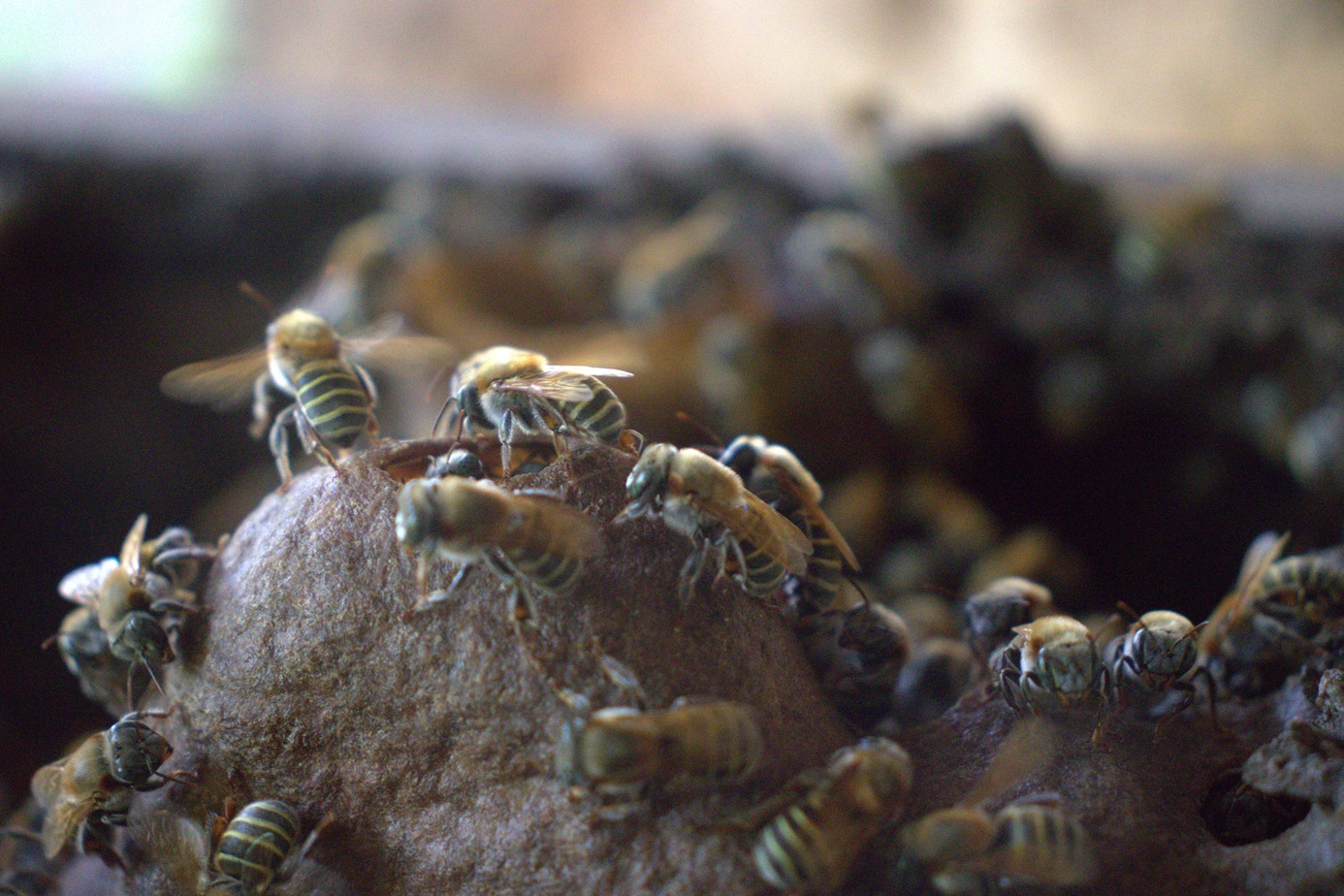
2025 was all about gearing up and working side-by-side with producers across the Nicoya region in northwestern Costa Rica to learn about the importance of pollinators for agriculture and biodiversity conservation. Whether it be a workshop with local stakeholders to reshape public policy or a session to learn about insect diversity in the country, local communities accepted the challenge to take on pollinator conservation and strengthen EbA practices in the Nicoya Peninsula to build safe habitats for our pollinating friends.
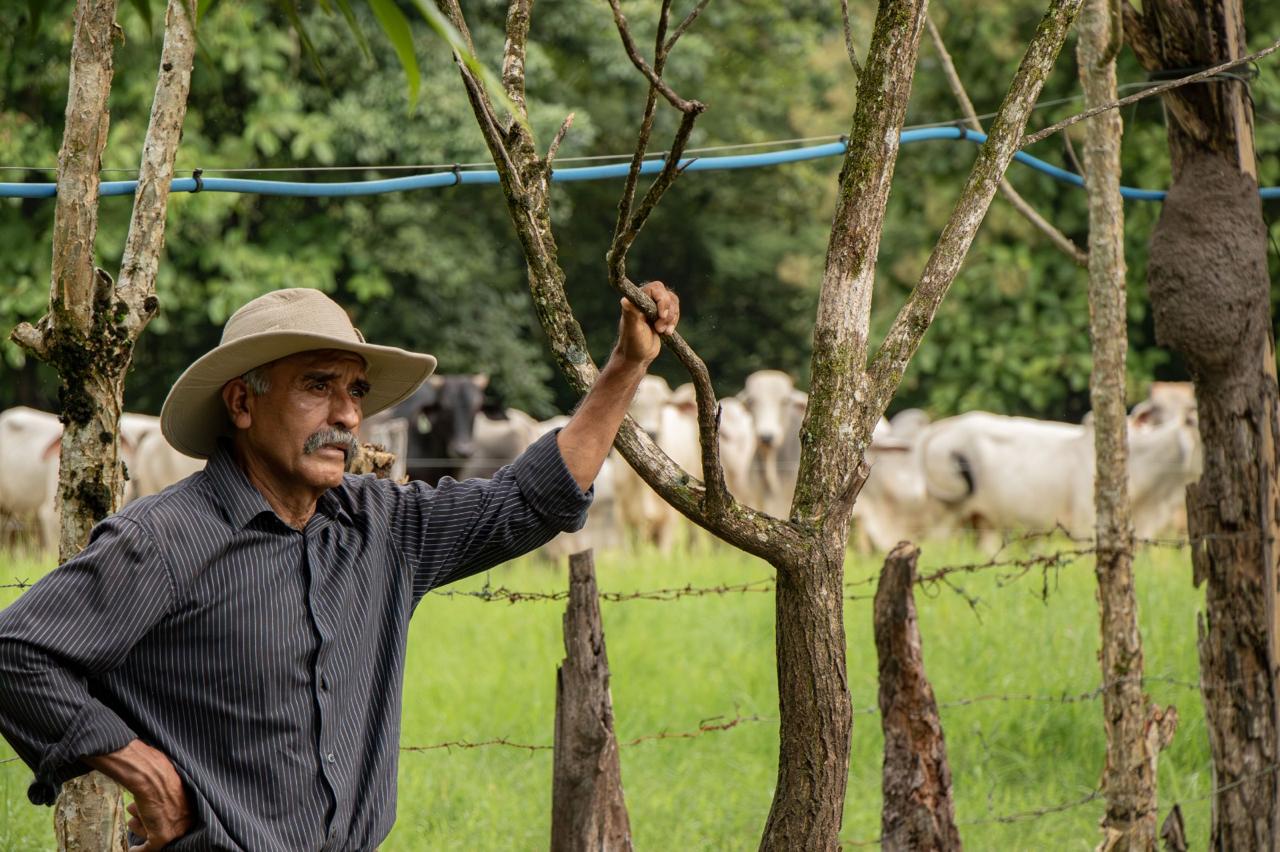
Just in time for the holidays, we are now ready to go beyond and will begin with the implementation of good practices and monitoring pollinators this coming year! Alongside our implementing partners and local counterparts, we identified 20 farms and sites with crops such as mango, avocado, coffee, and cantaloupe, as well as key ecosystems, that will engage in good practices and work with local communities and nature reserves to build a strong connectivity for pollinating species to thrive.
As we say goodbye to a year of milestones and achievements, we prepare for a 2026 that will bring new alliances, more knowledge exchanges with partners in the Global South, and scaling-up pollinator-friendly practices.
Poli-LAC is a regional program that aims to protect pollinating insects in Brazil, Costa Rica, Mexico, Paraguay, and Peru.
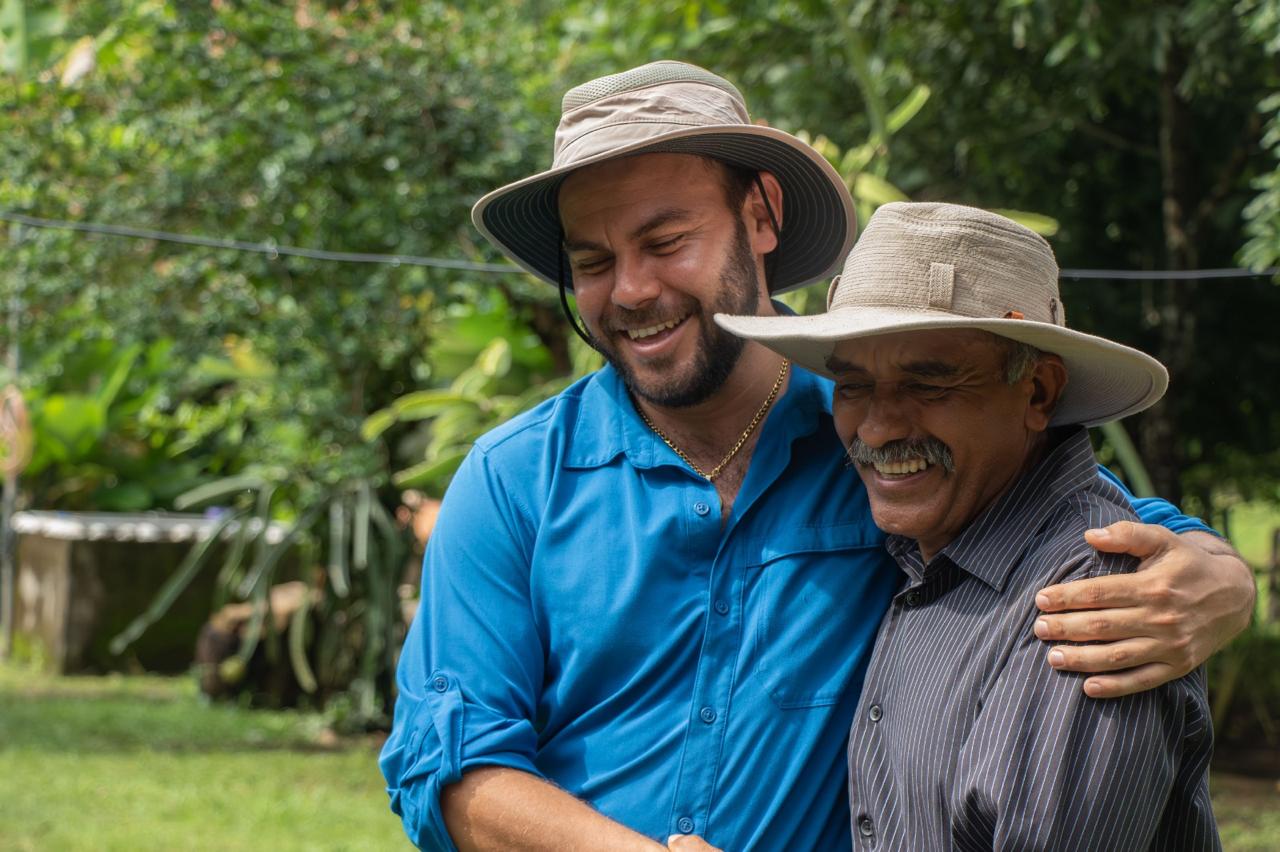
If you have any questions on how we got here or would like to hear more about us, do not hesitate to contact either lucia.artaviaguzman@giz.de or daniel.ortunofajardo@giz.de! Happy holidays!
Photos: © PolliLAC


Advancing Integrated Solutions for a Nature-Positive Future in the Caribbean
In 2025, the Biodiversity and Ecosystem Services Network marked a key milestone with the Second Caribbean Trialogue, held in Port of Spain, Trinidad and Tobago, on 2–4 December. Under the theme “Integrated Approach for Sustainable Ecosystem Management”, the Trialogue brought together policymakers, scientists and holders of Indigenous and local knowledge from seven Caribbean countries to co-create practical, cross-sectoral solutions that foster biodiversity and ecosystem resilience in the region.
Grounded in the principles of Theory U and the Multiple Evidence Base approach, participants explored how findings from the Transformative Change and Nexus Assessments of the Intergovernmental Science-Policy Platform on Biodiversity and Ecosystem Services can inform integrated responses across biodiversity, climate change, water, food and health. The dialogue deepened regional collaboration and reaffirmed a shared commitment to nature-positive, resilient and inclusive development.
Photo collage: © BES-Net

First Water Storage Tank Constructed and Commissioned Under the G-CREWS Project
February 5th, 2025 was a major achievement day for Grenada's water sector. The first Water Storage tank constructed under the Climate-Resilient Water Sector in Grenada (G-CREWS) project was officially commissioned. The 360,000 imperial gallons water tank is located at Tufton Hall, St. Mark, marking a significant step towards climate resiliency. Celebrating this milestone were key stakeholders - Government and Parliamentary representatives, NAWASA's Board of Directors, management and staff team and GIZ. The water storage tank is the first of several tanks being built under the G-CREWS Project to enhance water security across the island. The G-CREWS project is jointly financed by the Green Climate Fund (GCF) and the German Federal Ministry for the Environment, Climate Action, Nature Conservation and Nuclear Safety (BMUKN) under its International Climate Initiative (IKI) and the Government of Grenada. As of November 2025, 3 other Water Storage tanks have been constructed. All of these tanks have a capacity of 500,000 gallons.”
On top of their important achievement for 2025, G-CREWS wants to leave you with a couple of important messages for this holiday season.
Have you been naughty or nice in saving water this year? This Christmas jingle urges the citizens of Grenada to conserve water in the bathroom and while doing house chores even during the festive season.
This holiday season let's make a difference that lasts after the decorations come down. Gift the world a more sustainable future by making water conservation YOUR priority! Whether it’s swapping out old inefficient devices to water-efficient devices, improving your storage capacity, reducing water wastage, or spreading awareness, every drop counts! The G-CREWS project continues to encourage persons to invest in their conservation efforts.

Videos and photos: © G-CREWS


Under the Sun and in the Rain: Cultivating a Sustainable Future
Although the region comprises less than 2% of the world's land surface, it is home to approximately 12% of the planet’s flora and fauna – a wealth of biodiversity that sustains not only unique ecosystems, but also cultures, local economies, and ways of life deeply connected to biodiversity.
At the same time, this region, as compared to other parts of the world – and despite being responsible for less than 1% of global greenhouse gas emissions – disproportionately faces the impacts of climate change: Increasingly intense rainfall, prolonged droughts, and ecosystem disruptions that are putting the natural balance at risk and worsening long-standing inequalities.
This is where communities step in; women, youth, indigenous peoples, and coastal populations, many of whom depend heavily on natural resources and biodiversity. They are at the forefront of the solutions to these challenges.
Under the Sun and in the Rain: Stories of Resilience in Central America and the Caribbean is a new digital format featuring eight true stories of resistance, innovation, and hope.
These stories introduce you to the women ranchers, farmers, wetland guardians, young people in the refrigeration and air conditioning sector, indigenous communities, and water ambassadors who, in the face of climate challenges, are forging new ways of sustainable living.
The stories are the result of the work of cooperation projects funded by Germany’s International Climate Initiative (IKI): SCALA, C4 II, BIOFIN, G-CREWS, CCR, ACCIÓN Clima, ICCA-GSI, and From Farm to Fork. Each invites you to see climate change not only as a threat, but as an opportunity to build a fairer, more resilient future.
If you want to check out the new digital format, visit the website here.

Accelerating the Shift: Voices from the Caribbean E-mobility Forum
Are you ready for the electric transition? The Caribbean is moving swift to electrify its transport sector and meet its climate commitments (NDCs).
In April of 2025, the NDC-TEC Programme galvanized this shift by hosting the inaugural Caribbean Electric Mobility Forum in Antigua. This landmark event, organized in collaboration with UNEP, CMS, GIZ, and the Department of Environment of Antigua and Barbuda, gathered a powerful coalition: 68 participants from nine Caribbean countries and six other nations.
Set against the backdrop of pressing climate, transport, and energy challenges in the region, the forum brought together key public and private sector stakeholders, as well as academics, to foster collaboration and share good practices. The core mission was to identify opportunities for scaling sustainable transport solutions and overcome implementation barriers.
The forum created a successful regional platform to align efforts and advance a just and resilient transport transition. Its impact was clear and immediate, serving as a catalyst for accelerating the adoption of electric mobility solutions across the region.
“If you want to end up with a relic you can stay where you are, but otherwise times are moving and EVs are the new way,” says Mr. David Barett, Energy and Mobility Advisor, NDC-TEC Programme.
The E-mobility forum was more than a conference; it was a commitment to a sustainable future for the Caribbean. In this video, see what key stakeholders had to say about the forum and the urgent need for electric mobility.
Video: © NDC-TEC


Promoting the Restoration of Productive Ecosystems in the Central American Dry Corridor and the SICA Arid Zones: Creating an Enabling Environment for Productive Restoration
Progress continues toward strengthening the empowerment environment at both the operational and strategic levels. At the operational level, the first Farmer Field Schools, or “learning-by-doing” processes, were carried out with farmers in El Salvador, focusing on productive restoration practices. At the strategic level, several key regional instruments were completed: a communication strategy; an analysis of barriers and enabling conditions for scaling restoration; a mapping of financial institutions and incentives in the pilot countries (Honduras, El Salvador, and Guatemala); and a set of recommendations for integrating environmental and social management measures into projects. Additional progress was made in systematizing restoration best practices, strengthening national monitoring systems, and developing indicators for a regional progress report.
These tools, as well as the knowledge generated, now support the AFOLU dialogue platforms operating in each country, ensuring coordination between the environmental and agricultural sectors so that regional planning can translate into concrete actions for land recovery.

This Initiative focuses on promoting and scaling restoration across the arid and dry zones of the Central American Integration System (SICA, for its acronym in Spanish), creating the conditions needed to expand restoration efforts and actively seeking synergies with existing initiatives to increase their reach at both the national and regional levels. It is implemented by the executive secretariats of the Central American Commission for Environment and Development (CCAD, for its acronym in Spanish) and the Central American Agricultural Council (CAC, for its acronym in Spanish), together with the International Union for Conservation of Nature (IUCN), the United Nations Environment Programme (UNEP), and the Food and Agriculture Organization of the United Nations (FAO), which provides technical and administrative leadership.
Thanks to its strong alignment with regional principles and its contributions to national and regional commitments – including the SICA Regional AFOLU 2040 Initiative – the project has been recognized as a global flagship initiative by the United Nations Decade on Ecosystem Restoration.
Current actions focus on expanding the benefits of restoration, strengthening regulatory frameworks, and integrating monitoring systems, always ensuring the inclusion and participation of local actors.
Photos: © Central American Dry Corridor Flagship

ACCIÓN Clima: From local action to political incidence of Costa Rica
2025 was an especially active year for the ACCIÓN Clima project, marked by progress, new partnerships, and memorable moments. Here’s a look at the highlights:
The "Green Sheep" programme
In a cool mountain region of Costa Rica, in the coffee-growing region known as “Los Santos” or "The Saints," lives a green sheep – or several of them, really – because 100 families are now enrolled in the Oveja Verde or “Green Sheep” programme for organic waste management. This effort comes in response both to the national crisis caused by saturated landfills and to the country’s Nationally Determined Contribution (NDC).
Call for Open Innovation
Working hand in hand with local organizations and Costa Rica’s National System of Conservation Areas (SINAC, for its acronym in Spanish) under the Ministry of the Environment and Energy (MINAE, for its acronym in Spanish), the Call for Open Innovation made it possible to develop a holistic solution using advanced technology and automated data analysis. The goal is to identify and manage the marine and terrestrial climate refuges where science predicts climate change will advance more slowly, and therefore, where a variety of species can adapt.
Disruptive Municipalities
Costa Rica's canton of Cañas is highly vulnerable to flooding. During the Disruptive Municipalities (Munis Disruptivas) innovation process, the municipality's team created SIMATH, a Hydro-Environmental Monitoring and Early Warning System that enables communities to carry out preventive measures in the face of climatic events.
NDC 3.0
ACCIÓN Clima supported advancing Costa Rica’s climate goals as set out in their NDC 2.0, through actions like the ones you’ve just seen. More recently, the project supported MINAE’s Directorate of Climate Change in the design and development of the updated NDC 3.0, including engagement from sectors such as youth, Indigenous Peoples, private sector, women, and others, resulting in a multi-stakeholder, multi-focus, participatory NDC.
Photos: © ACCIÓN Clima


© Wildlife Conservation Society, Papua New Guinea

© Edgard Leonardo Davila Panduro
© Ayan Villafuerte

© Ho Ngoc Anh Tuan

© Rebecca García Campos

© CORE/Frantz Eliscar
A photo says more than 1,000 words…
Every IKI project does important work all over the world – and in 2025, IKI took the opportunity to highlight their beauty, diversity, and impact with a Photo Competition!
From local community trainees in Papua New Guinea to native amazonian bee pollinators and all the way to the solar farms in the Philippines – explore the winners of the 2025 competition! The winning photos were also featured at COP30 and will be displayed in a digital exhibition.
Check out the main winners in the photo gallery above.
Among the notable entries, we are proud to share contributions from right here in Central America and the Caribbean:
- A project in Punta Cana, Dominican Republic, shared a snapshot of divers outplanting corals and monitoring restoration when the ocean suddenly darkens under massive waves of sargassum, a surreal reminder of climate change and the direct pressures on Caribbean ecosystems.
- Another project in Haiti contributed the photo of three students of an Environmental Club that joined a reforestation activity in Ti Plaine, on the International Day for the Conservation of Mangrove Ecosystems. By planting young trees at the heart of the watershed, they contribute to a stronger and more resilient coastline.
Can’t get enough of the impressive images of IKI’s work around the globe? Check out the rest of the photos here.


RECSOIL: From Soil to Climate Recognition
In 2025, Costa Rica advanced its efforts to recarbonize agricultural soils by strengthening the pilot phase of the RECSOIL initiative (Recarbonización de los Suelos Globales, or Global Soil Recarbonization), promoted by the Food and Agriculture Organization of the United Nations (FAO) and its Global Soil Partnership (GSP). This initiative aims to restore organic carbon in agricultural soils through sustainable practices and recognition mechanisms for producers.
The RECSOIL Costa Rica pilot brings together key players, such as the Ministry of Agriculture and Livestock (MAG, for its acronym in Spanish), the National Forestry Financing Fund (FONAFIFO, for its acronym in Spanish), the National Institute of Innovation and Transfer in Agricultural Technology (INTA, for its acronym in Spanish), the private coffee and dairy sectors, the University of Costa Rica (UCR), and the Costa Rican Soil Science Association. Technical support is provided by FAO and UNDP through the SCALA project (Scaling up Climate Ambition on Land Use and Agriculture), backed by the International Climate Initiative (IKI).
As a result of this participatory monitoring, reporting, and verification (MRV) process, as well as the application of Sustainable Soil Management (SSM) protocols, more than 45 livestock and coffee farms strengthened the technical foundation for Costa Rica’s first national Payment for Environmental Services in Soil (PSA-Suelo) plan.
Of these farms, 31 pilot sites – 17 from NAMA Ganadería (livestock), 7 from the coffee sector, and 7 from the private dairy sector – are ready to receive payment for the climate services provided by their soils. These payments recognize the carbon stored through sustainable practices such as rational grazing, the incorporation of organic matter, and improved vegetative cover.
This achievement represents the consolidation of an innovative public–private collaboration model that links soil science with both climate policy and on-farm actions, contributing directly to national goals on decarbonization, resilience, and the restoration of productive landscapes.
Further reading:
- How does the RECSOIL initiative promote change in Costa Rica (Spanish only)
- News article: Initiative promotes soil health and combats climate change in Costa Rica (Spanish only)
Photo collage: © SCALA


Facts & figures on IKI’s impact around the world: Annual Report 2024 out now
Did you know that between 2015 to 2023 over 1.6 million people were directly or indirectly supported by IKI projects to adapt to climate change and/or to conserve ecosystems? Or that over 27 million hectares of ecosystems were improved or protected? No? Surely, you’ve heard that over 18 million tons of CO2 equivalent were directly or indirectly mitigated by IKI projects?
If any of these numbers are new to you, you might want to check out the 2024 IKI Annual Report. It provides concise information, data, and metrics based on the IKI Standard Indicators to record selected results across the entire funding programme. During the last year, IKI analysed its impact over the period of 2015 to 2023, and provided key facts and figures for 2024.
In the past year, IKI was able to almost fully disburse its allocated budget line of EUR 735 million. This includes the funds that were made available to IKI for the year in the Federal Budget. Expenditure for ongoing and new projects amounted to EUR 703 million.
All in all, a successful 2024!
For more details, access the 2024 Annual Report here.
Image: © IKI


One of the main goals of the IKI project BioFinCas is to discover how to grow coffee, cocoa, and bananas without disrupting the harmony with nature. But a key question arises: how can we know if we are truly helping biodiversity flourish on these farms?
This is where monitoring becomes essential. And then the most powerful and natural answer emerges: who better to observe, record, and understand these changes than the producers themselves, the guardians of the land? With their attentive gaze and deep connection to the landscape, they are the ones who can tell the true story of what is happening.
In the Dominican Republic and Guatemala, the use of the iNaturalist app has become established as a key tool for participatory biodiversity monitoring, involving farmers and rural youth in species recording.
“The iNaturalist app has become extremely important for the CEDAE Nature Center, as it has proven to be a useful tool for participatory biodiversity monitoring within the framework of the BioFinCas project in the Dominican Republic. Its use has enabled producers and young people from rural communities to become involved in species recording, strengthening the link between science and the local population.” — Javiel Almonte, CEDAE Nature Center, Dominican Republic.
With these advances, BioFinCas reinforces its commitment to biodiversity conservation in the region.
Photo: © BioFinCas

Strengthening Capacities to Protect Mangroves in the Bay Islands, Honduras
In 2025, interinstitutional cooperation and local capacities were strengthened to protect the mangroves of the Bay Islands. The Mangrove Ecosystem Conservation and Protection Workshop brought together 21 representatives from governmental, environmental, and security institutions across the three islands, creating a space for exchanging knowledge on restoration, monitoring, and the control of environmental offenses.
Commitments were strengthened to create municipal nurseries for mangroves and native plants, aligned with the International Climate Initiative's (IKI) 2030 strategy to build climate resilience, conserve biodiversity, and empower communities. A final field visit to the mangroves of French Key connected theory and practice, reaffirming that collective action is one of the most powerful tools for restoring coastal ecosystems.

The Mangrove Restoration Program in the Bay Islands and the Importance of a Comprehensive Diagnostic Assessment
With the goal of strengthening the mangrove restoration program in the Bay Islands, BICA carried out a comprehensive technical diagnostic in Utila, Roatán, and Guanaja. Eight key restoration sites were identified, physical parameters such as pH and salinity were assessed, and restoration strategies were developed for each ecosystem, including natural regeneration, direct planting and micro-channel restoration.
Nurseries in Roatán and Guanaja were also strengthened, and one is now under construction in Utila, with an emphasis on seed selection and efficient seedling propagation. Participation from local communities, private companies and the armed forces was incorporated as a core component to ensure the long-term sustainability of restoration efforts. This diagnostic strengthens both institutional and local capacities to protect and recover mangroves, contributing to biodiversity conservation and climate resilience in the Bay Islands.
Video and photos: © IKI Small Grants project, Honduras


Get to know the IKI monitoring guidelines!
Planning on submitting a new IKI project in the 2025 IKI Large Grants Call? We recommend you take a look at IKI’s monitoring guidelines first!
The document provides an overview of the IKI funding program structure, results logic, and available funding instruments. It explains the Monitoring and Evaluation framework, including project and programme level monitoring, evaluation processes, and the integration of safeguards and gender considerations.
It also offers guidance on designing results-oriented projects, developing results-based monitoring frameworks, selecting appropriate Standard Indicators (SIs) and Strategic Objectives (SOs), and aligning with IKI’s safeguards, gender, and knowledge management requirements.
Access the document here or download below.

Inspiring to Transform: Kimberly’s Climate Journey
The project Youth for Climate Action in El Salvador gave Kimberly an opportunity to learn and become aware of environmental protection issues. With her theatrical talent, she conveys awareness messages through environmental plays that inspire other young people. Inspired by this process, she also developed her entrepreneurial skills and, with seed capital support, will launch a green technology (renewable energy) venture that will enable her to generate sustainable income and reduce greenhouse gases.
The project is financed through IKI Medium Grants and implemented by Bread for the World (Brot für die Welt) and the Salvadorian Ecological Unit (UNES).
We encourage you to take a look at the video and activate the automatic subtitles in English on the right bottom corner of the screen to better understand Kimberly's Journey.
Video: © UNES

Capacity building for terrestrial and marine productive sectors in Costa Rica
During 2025, the TRANSFORMA-INNOVA Program consolidated significant progress in strengthening technical capacities in the coffee, livestock, musaceae, and blue economy sectors.
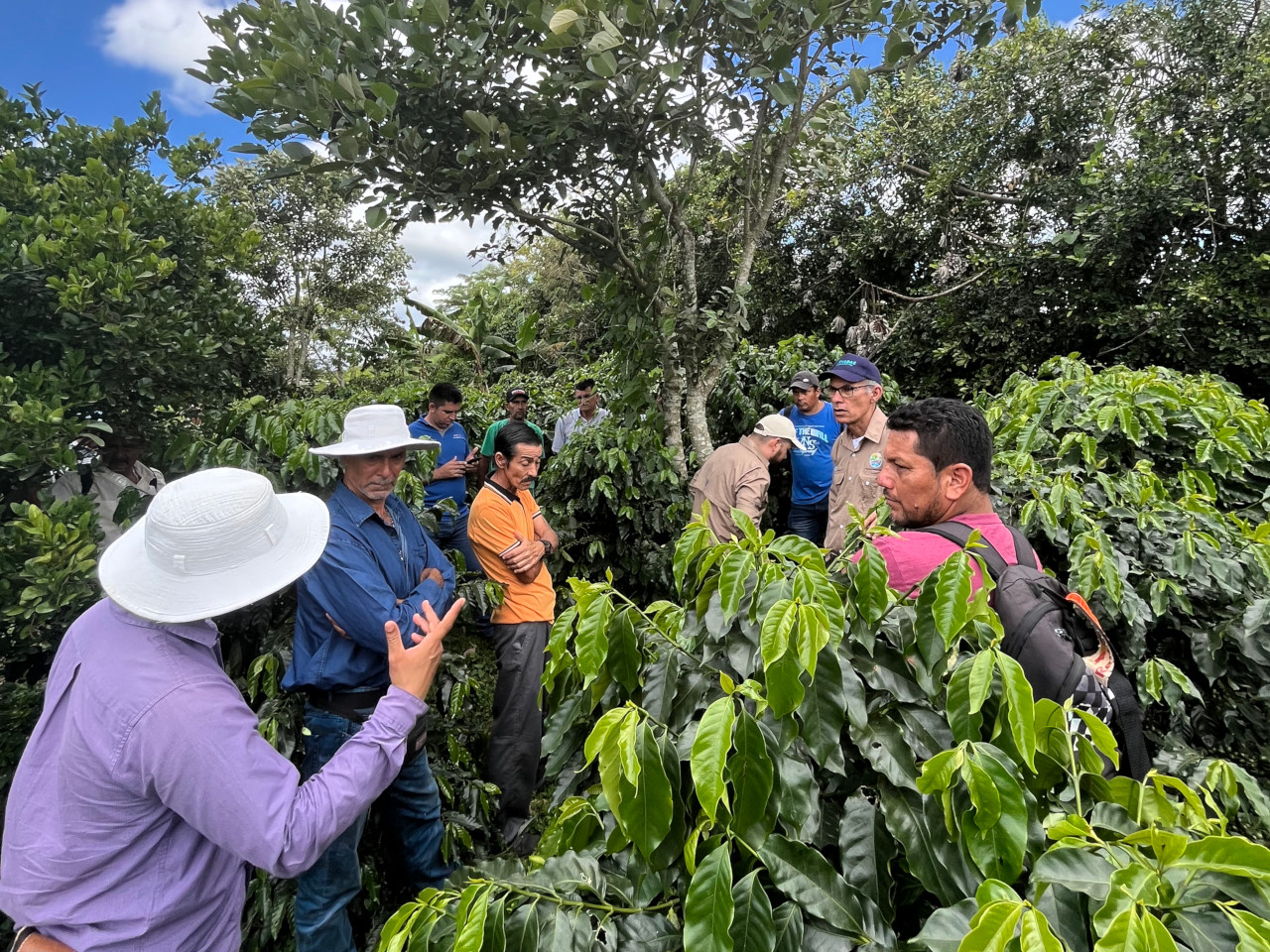
NAMAs in the coffee, livestock, and musaceae sectors
This year, the project's agricultural component trained 4,964 people throughout Costa Rica, with women accounting for nearly 30% of participants. The training activities combined theoretical and practical methodologies, such as field days on model farms, field schools for the production of bio-inputs, learning tours, training processes for technical personnel, and the promotion of communities of practice to disseminate the application of good agricultural and manufacturing practices within Costa Rica's Nationally Appropriate Mitigation Actions (NAMAs) for the coffee, livestock, and musaceae sectors. These activities made it possible to reinforce the adoption of sustainable practices and improve the quality of production processes in the prioritized territories.
Marine-coastal value chains
For its part, the blue economy component of the program strengthened the capacities of approximately 400 people through 25 training processes aimed at coastal communities. The content covered sustainable fishing and aquaculture practices, marine governance, financial skills, conflict resolution, gender equality, and community leadership. This multidimensional approach helped to strengthen local competencies for the sustainable management of marine and coastal resources and the improvement of livelihoods linked to productive activities.
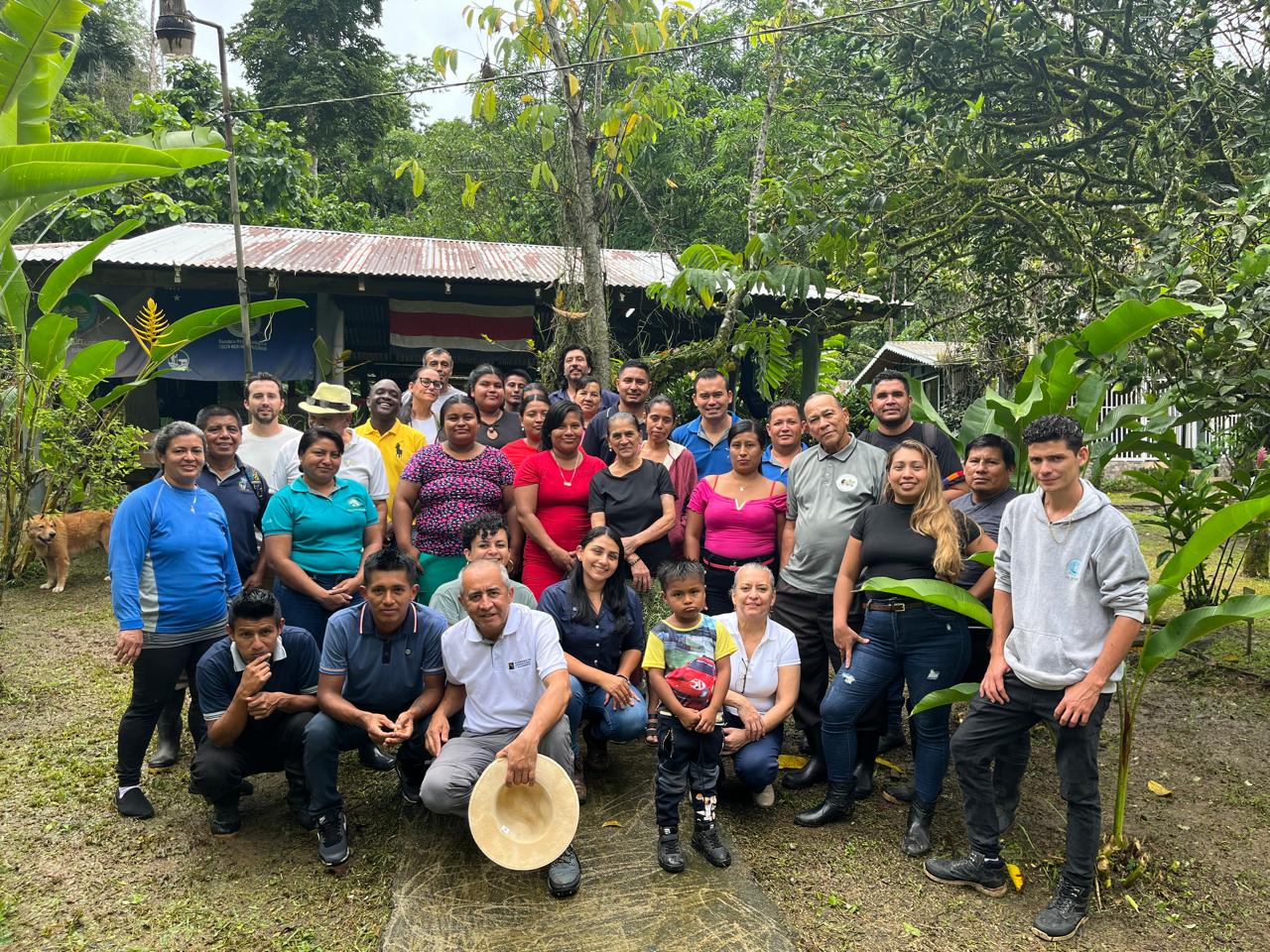
Multisectoral integration
The magnitude and diversity of these processes reflect the high level of technical coordination required by the program to address the needs of multiple sectors and populations in a comprehensive and coordinated manner. The results achieved in 2025 highlight the importance of capacity building as a central component in advancing the transformation of more sustainable, resilient, and inclusive terrestrial and coastal marine value chains.
Photos: © Transforma-Innova

Dive into a unique 360° experience! 🌿✨
The EbA LAC programme invites you to explore Costa Rica's resilient agro-landscapes. The programme implements Ecosystem-based Adaptation (EbA) measures to help people and ecosystems increase their capacity to adapt to the negative impacts of climate change, ensuring the protection of their livelihoods.
In this immersive experience – where life flows among forests, rivers, wildlife, flora and communities – you can see how solutions to climate change take shape. Through the immersive BIOcorredores video, you’ll discover how biological corridors act as bridges of life and how sustainable production and community-based management strengthen local resilience. Come feel, listen, and connect with a place that inspires and transforms.
For a better experience, we recommend that you click the link to open the 360° experience in full screen.
© EbA LAC

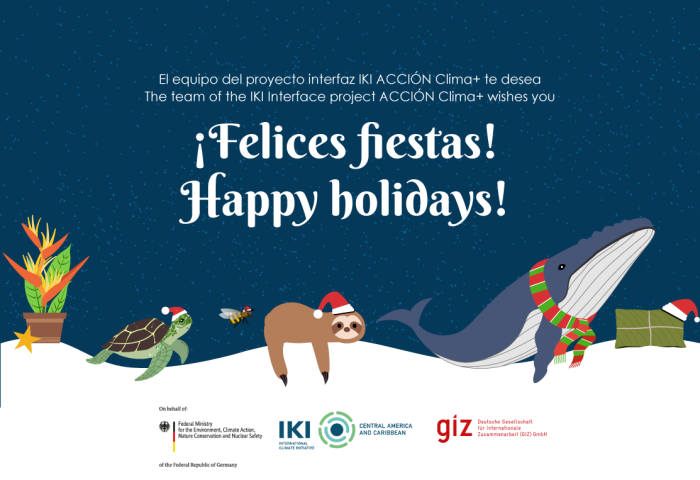
We've reached the last door of this Advent Calendar! On behalf of the ACCION Clima project as IKI interface project for Central America and the Caribbean, we thank all projects in the region for their efforts and participation in the exchange formats we offered throughout the year.
See you in 2026!
Graphic: © IKI Interface for Central America and the Caribbean (ACCIÓN Clima)